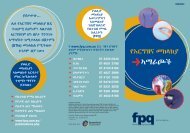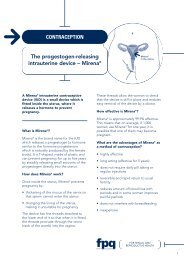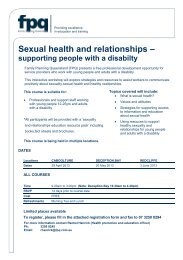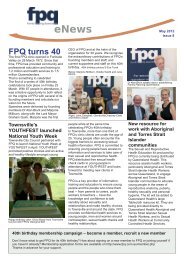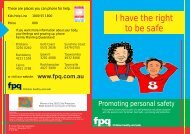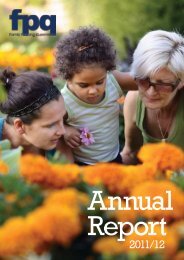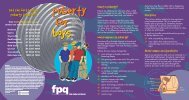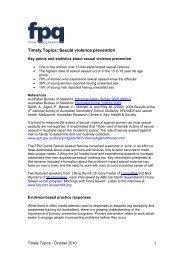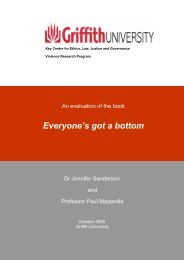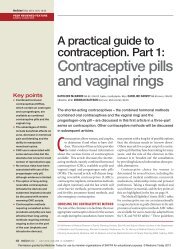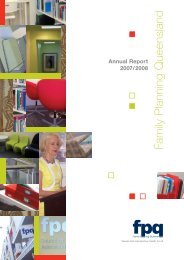Introduction to activity books - Family Planning Queensland
Introduction to activity books - Family Planning Queensland
Introduction to activity books - Family Planning Queensland
Create successful ePaper yourself
Turn your PDF publications into a flip-book with our unique Google optimized e-Paper software.
<strong>Introduction</strong> <strong>to</strong> <strong>activity</strong> <strong>books</strong><br />
FPQ: sexuality and relationships education<br />
<strong>Family</strong> <strong>Planning</strong> <strong>Queensland</strong> (FPQ) is a leading provider of sexual and reproductive health services.<br />
Since its first clinic session in 1972, FPQ has offered clinical, education, information and training services<br />
for metropolitan and regional locations throughout <strong>Queensland</strong>. FPQ is committed <strong>to</strong> providing education<br />
and information services <strong>to</strong> all people. This includes people with a disability.<br />
All people are sexual beings throughout their life. Sexuality influences how people understand themselves<br />
and how they relate <strong>to</strong> others. It encompasses the physical, social, emotional and psychological elements<br />
of the human make up and includes sexual identity, sexual orientation and sexual behaviour.<br />
Learning about sexuality is a lifelong process, which includes the gathering of information and the<br />
formation of attitudes, beliefs and values about identity, relationships and intimacy.<br />
Sexuality and relationships education aims <strong>to</strong>:<br />
provide a sound foundation for the development of healthy sexual identity<br />
provide age appropriate information<br />
provide information in a way that encourages acceptance of self and others<br />
empower young people <strong>to</strong> deal with exploitive situations<br />
encourage young people <strong>to</strong> choose <strong>to</strong> be sexually healthy<br />
enhance relationships<br />
Generally, children who receive comprehensive sexuality and relationships education from an early age:<br />
understand and accept with confidence, physical and emotional changes<br />
feel positive about their bodies<br />
appreciate and accept individual differences<br />
feel good about themselves as males and females<br />
are capable of communicating about sexual matters,<br />
understand appropriate and inappropriate behaviour<br />
are less vulnerable <strong>to</strong> exploitation and sexual abuse<br />
Most parents, carers and professionals recognise the importance of children and young people having<br />
accurate, age-appropriate sexuality and relationships education as they grow. It is important that people<br />
with a disability receive positive messages about sexuality. It is also important that parents, carers,<br />
schools and support services work <strong>to</strong>gether <strong>to</strong> promote healthy attitudes and <strong>to</strong> give children, young<br />
people and adults encouragement that it is ok <strong>to</strong> discuss sexuality issues with the parents, carers and<br />
professionals in their lives.<br />
<strong>Introduction</strong> <strong>to</strong> Every body needs <strong>to</strong> know <strong>activity</strong> <strong>books</strong> Page 1<br />
© <strong>Family</strong> <strong>Planning</strong> <strong>Queensland</strong> 2010
Everybody needs <strong>to</strong> know <strong>activity</strong> <strong>books</strong><br />
The Everybody needs <strong>to</strong> know <strong>activity</strong> <strong>books</strong> have been developed <strong>to</strong> assist parents and carers in the<br />
important role they have in providing sexuality and personal safety education for their children, young<br />
people and adults. Parents, carers and professionals are encouraged <strong>to</strong> openly discuss the content in<br />
each of the <strong>activity</strong> <strong>books</strong> as well as respond <strong>to</strong> questions, interests and curiosity about sexuality and<br />
relationships education <strong>to</strong>pics. The worksheets contained in the <strong>activity</strong> <strong>books</strong> can provide a focus point<br />
for these discussions.<br />
These <strong>activity</strong> <strong>books</strong> allows for flexible delivery of sexuality education. It is recommended that the <strong>activity</strong><br />
<strong>books</strong> be adapted <strong>to</strong> best suit the learning needs and interests of the individual.<br />
Please note that worksheets may be pho<strong>to</strong>copied.<br />
Points for parents and carers<br />
You are the primary sexuality educa<strong>to</strong>rs of your children. They learn their beliefs and values with you.<br />
Teaching about sexuality is an ongoing responsibility, not just a one-off talk about "the facts".<br />
Feelings, values and decision-making skills are vital components.<br />
Children learn about sexuality every day, not only from you, but also from friends, school, the media<br />
and society in general.<br />
It is never <strong>to</strong>o early, nor <strong>to</strong>o late <strong>to</strong> start talking about sexuality.<br />
Use learning moments (eg a pregnant friend, an event on TV, a litter of puppies) <strong>to</strong> discuss sexuality<br />
issues. Don't wait <strong>to</strong> be asked. Be proactive.<br />
Remember your non-verbal messages are as important as what you say. Your children are aware of<br />
what you do and don't say, your reactions and your behaviour. Make sure your actions are consistent<br />
with the values you are trying <strong>to</strong> impart.<br />
You don't have <strong>to</strong> be an expert on the <strong>to</strong>pic of sexuality. Respect for your children and listening<br />
attentively and non-judgementally will help you in educating your children about sexuality.<br />
Use correct terminology for reproductive body parts. Acknowledge that different words are used for<br />
these body parts but during these sessions scientific terms will be used. Explain <strong>to</strong> your children that<br />
using correct terminology is empowering them with correct knowledge and allows everyone <strong>to</strong><br />
communicate clearly.<br />
Answer questions briefly and factually, at your child's level of understanding. Too much information<br />
will not harm them, but they may find it boring.<br />
Use your sense of humour when talking about sexuality. Most conversations need not be <strong>to</strong>o serious.<br />
Have a variety of <strong>books</strong>, pamphlets and other resources available, for both you and your children.<br />
You are your child's role model. Model respect for feelings and the right of privacy by maintaining<br />
confidentiality. Model acceptance and understanding by resisting the temptation <strong>to</strong> argue, preach or<br />
give advice.<br />
It is good <strong>to</strong> <strong>to</strong>uch and hug your children and show love, regardless of how old they are.<br />
<strong>Introduction</strong> <strong>to</strong> Every body needs <strong>to</strong> know <strong>activity</strong> <strong>books</strong> Page 2<br />
© <strong>Family</strong> <strong>Planning</strong> <strong>Queensland</strong> 2010
Points for professionals<br />
Children, young people and adults with a disability have the right <strong>to</strong> receive information and support<br />
about sexuality, relationships and reproductive health. It is important that people receive positive<br />
messages about their sexuality, sexual development and safety.<br />
Sexuality and relationships education should be conducted within and according <strong>to</strong> organisational<br />
policies and values frameworks. The existence of and adherence <strong>to</strong> sexuality and relationships<br />
education policies gives facilita<strong>to</strong>rs, participants, parents/carers and the community an expected<br />
standard and structure for a sexuality and relationships education program.<br />
Seek the support of colleagues when you can, it is important for you <strong>to</strong> also feel supported.<br />
Answering questions<br />
When answering questions be brief, factual and positive. Also remember <strong>to</strong>ne and body language when<br />
answering all questions. Attempt <strong>to</strong> address all questions, no matter how silly or confronting they may<br />
appear. Even questions that may appear silly can mask a serious agenda. It is useful <strong>to</strong> use a variety of<br />
strategies when answering questions.<br />
These approaches may include:<br />
Continuum<br />
o “Some people believe . . ., whilst others believe . . . . Most people's beliefs fall<br />
somewhere in between.” (This could be relevant for an issue such as abortion.)<br />
"I don't know."<br />
o It is honest and acceptable <strong>to</strong> admit your lack of knowledge. Always make a plan,<br />
including a time frame, <strong>to</strong> learn the answer and inform the participants. Sometimes you<br />
could ask the group or suggest someone does some research in<strong>to</strong> the question.<br />
Always check that an accurate answer is given.<br />
Personal<br />
o<br />
"That is a personal question. Our rules try <strong>to</strong> remind us not <strong>to</strong> ask personal questions. I<br />
would prefer not <strong>to</strong> answer it.”<br />
Turning the question around<br />
o "That's a good question. What made you think of that?"<br />
This can help <strong>to</strong> clarify what the question is really about and what may have motivated<br />
the participant <strong>to</strong> ask. Sometimes questions are asked <strong>to</strong> test if it is safe <strong>to</strong> ask all<br />
questions or if an honest answer will be given. Young people’s questions and curiosity<br />
about sexuality are natural and based upon their childhood perceptions, not adult<br />
perceptions of sexual <strong>activity</strong> or sexuality. Establishing what has motivated a question<br />
can help <strong>to</strong> formulate a clear and accurate answer that meets the participants’ needs in<br />
an age appropriate manner.<br />
Using the <strong>activity</strong> <strong>books</strong><br />
The following issues should be considered prior <strong>to</strong> and during the use of the <strong>activity</strong> <strong>books</strong>.<br />
It is important <strong>to</strong> consider:<br />
age appropriate communication<br />
clear and uncluttered information and language<br />
speed of speech<br />
allowing time for responses<br />
voice <strong>to</strong>ne and volume<br />
checking for understanding of the content<br />
<strong>Introduction</strong> <strong>to</strong> Every body needs <strong>to</strong> know <strong>activity</strong> <strong>books</strong> Page 3<br />
© <strong>Family</strong> <strong>Planning</strong> <strong>Queensland</strong> 2010
einforcing and repeating ideas<br />
use of clear concrete visuals and resources<br />
use of signing and symbols<br />
People often benefit from:<br />
reviews at the beginning, during and after the discussion<br />
reminders, discussions<br />
linking key information <strong>to</strong> the person’s everyday life<br />
concrete reminders of information, for example, worksheet folders, communication <strong>books</strong>, charts,<br />
certificates, pho<strong>to</strong>s, posters<br />
assistance of a support person <strong>to</strong> review content<br />
Ground rules<br />
If you are going <strong>to</strong> run a formal session with a participant it is important <strong>to</strong> set up some ground rules. This<br />
creates safety and enables the subject matter <strong>to</strong> be approached with a set of guidelines.<br />
you could ask the participant what rules they think are needed<br />
write or draw the rules on<strong>to</strong> poster paper and display<br />
it is essential that these rules are kept, discussed and displayed at the beginning of each sexuality<br />
and relationships education lesson<br />
as the facilita<strong>to</strong>r it is important <strong>to</strong> follow and model the ground rules<br />
Rules <strong>to</strong> include:<br />
Choose pictures from magazines or draw pictures <strong>to</strong> match the rules if required.<br />
Ask questions<br />
It is important <strong>to</strong> encourage questions. All questions should be treated with respect and answered<br />
positively, briefly and factually.<br />
OK <strong>to</strong> be embarrassed<br />
Explain that giggling or laughter is often a way of showing you are feeling embarrassed.<br />
“It is ok <strong>to</strong> feel embarrassed. People often feel embarrassed talking about bodies and relationships. It<br />
helps <strong>to</strong> take a big deep breath if you are feeling embarrassed or nervous. Let’s practice taking a deep<br />
breath now.”<br />
Be private<br />
It is important <strong>to</strong> remind the participant not <strong>to</strong> talk <strong>to</strong> everyone about the content of these lessons. This<br />
reinforces rules about private talk. “Appropriate people <strong>to</strong> speak with” is a <strong>to</strong>pic <strong>to</strong> be addressed in each<br />
lesson.<br />
When establishing this ground rule it is essential <strong>to</strong> tell the participant that if they disclose any kind of<br />
physical, emotional or sexual violence you will have <strong>to</strong> tell someone else. Some things are <strong>to</strong>o important<br />
<strong>to</strong> stay in the room.<br />
“During these lessons we will be talking about private things. It is important <strong>to</strong> remember there are rules<br />
for talking about private things. It is ok <strong>to</strong> talk <strong>to</strong> me or another adult that you trust about these lessons<br />
but remember it is not ok <strong>to</strong> talk <strong>to</strong> everyone.”<br />
Be nice <strong>to</strong> each other<br />
A reminder that while doing these lessons that everyone needs <strong>to</strong> be respectful of each other’s feelings.<br />
If in a group, this rule allows the facilita<strong>to</strong>r <strong>to</strong> interrupt teasing and put downs and draw attention <strong>to</strong><br />
appropriate behaviour. This rule can also be used <strong>to</strong> remind participants that it is not ok <strong>to</strong> ask private<br />
questions of the facilita<strong>to</strong>r or other group members.<br />
<strong>Introduction</strong> <strong>to</strong> Every body needs <strong>to</strong> know <strong>activity</strong> <strong>books</strong> Page 4<br />
© <strong>Family</strong> <strong>Planning</strong> <strong>Queensland</strong> 2010
Sensitivity <strong>to</strong> the Subject Matter<br />
Sexuality and relationships education for people with a disability requires an acknowledgment of the<br />
sensitive nature of the content area. Often people with an intellectual disability have had limited education<br />
regarding sexuality and may have had negative experiences relating <strong>to</strong> many of the <strong>to</strong>pic areas. Many<br />
people with a disability may have little or no control over their freedom <strong>to</strong> express themselves sexually.<br />
Many people have had decisions made by others for them with regard <strong>to</strong> their own sexual health.<br />
Self protection theory<br />
It is important <strong>to</strong> be aware of sexual assault issues and self protection theory before using the <strong>activity</strong><br />
<strong>books</strong>. Talking <strong>to</strong> people with a disability about their bodies, about being private, recognising feelings and<br />
early warning signs, types of <strong>to</strong>uch, communicating with others and a safety network is important from an<br />
early age. In a sexuality and relationships education program sexual intercourse and sexual relationships<br />
should always be discussed within the context of informed consent, pleasure, privacy and choices.<br />
Omitting discussion about sexual <strong>activity</strong> in a sexuality and relationships education program will not<br />
prevent sexual exploitation. FPQ supports the fact that comprehensive sexuality and relationships<br />
education can help participants <strong>to</strong> understand their right <strong>to</strong> consensual sexual <strong>activity</strong> and safety.<br />
Children, young people and adults with a disability will be more able <strong>to</strong> assert themselves and<br />
communicate in order <strong>to</strong> receive support if they know you are comfortable talking with them.<br />
Responding <strong>to</strong> a disclosure<br />
The parent/carer/facilita<strong>to</strong>r can help participants who disclose sexual abuse/assault behaviour by:<br />
not panicking or expressing shock or outrage<br />
ensuring privacy when talking <strong>to</strong> the participant<br />
listening<br />
telling them that they believe them<br />
saying they are pleased they <strong>to</strong>ld them and that it was the right thing <strong>to</strong> do<br />
emphasising that whatever has happened was not their fault<br />
telling them that some people do wrong things<br />
acknowledging that it is hard <strong>to</strong> talk about such things<br />
not giving promises that can’t be kept for example, that you won’t tell anyone or that you will s<strong>to</strong>p it<br />
happening again<br />
understanding and adhering <strong>to</strong> the organisational policy (if applicable) on managing disclosure of<br />
sexual abuse<br />
It is not the job of most facilita<strong>to</strong>rs <strong>to</strong> investigate the nature or detail of an allegation, nor the truth of a<br />
disclosure. For more information on responding <strong>to</strong> disclosures please visit www.childsafety.qld.gov.au<br />
<strong>Introduction</strong> <strong>to</strong> Every body needs <strong>to</strong> know <strong>activity</strong> <strong>books</strong> Page 5<br />
© <strong>Family</strong> <strong>Planning</strong> <strong>Queensland</strong> 2010
© <strong>Family</strong> <strong>Planning</strong> <strong>Queensland</strong> 2010<br />
PO Box 215<br />
Fortitude Valley<br />
QLD 4006<br />
Australia<br />
Phone: +61 7 3250 0240<br />
info@fpq.com.au<br />
www.fpq.com.au<br />
Worksheets courtesy of FPQ publication, Every body needs <strong>to</strong> know<br />
Illustrations by Cathy Stephens<br />
Disclaimer<br />
<strong>Family</strong> <strong>Planning</strong> <strong>Queensland</strong> (FPQ) has taken every care <strong>to</strong> ensure that the information contained in this document is accurate<br />
and up-<strong>to</strong>-date at the time of being printed. As information and knowledge is constantly changing, readers are strongly advised <strong>to</strong><br />
confirm that the information complies with present research, legislation and policy guidelines. FPQ accepts no responsibility for<br />
difficulties that may arise as a result of an individual acting on the advice and recommendations it contains.<br />
Version 2 / January 2012<br />
<strong>Introduction</strong> <strong>to</strong> Every body needs <strong>to</strong> know <strong>activity</strong> <strong>books</strong> Page 6<br />
© <strong>Family</strong> <strong>Planning</strong> <strong>Queensland</strong> 2010



